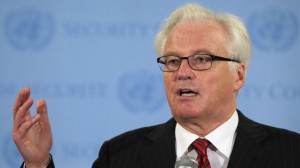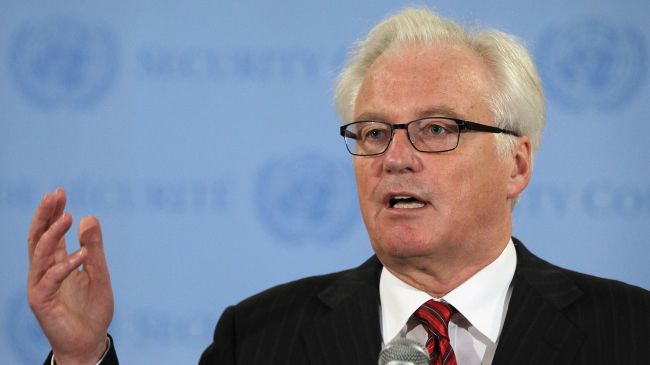 Russia's Permanent Representative to the United Nations Vitaly Churkin says the US-engineered unilateral sanctions against Iran are causing humanitarian problems in the Islamic Republic.
Russia's Permanent Representative to the United Nations Vitaly Churkin says the US-engineered unilateral sanctions against Iran are causing humanitarian problems in the Islamic Republic.In an interview with the Russia Today on Sunday, Churkin said, �Some of the things which are being done by some members of the six (the P5+1 group of world powers comprising Britain, China, France, Russia and the US plus Germany) are counterproductive because, in addition to Security Council sanctions, they piled up all sorts of unilateral sanctions, which we believe are not needed as a matter of principle.�
Churkin added that the sanctions were creating humanitarian problems in Iran and causing �some bad blood in the [Iran-P5+1] talks with Iran which is not really necessary.�
The United States, Israel and some of their allies have repeatedly accused Iran of pursuing non-civilian objectives in its nuclear energy program.
Over the false allegation, Washington and the European Union have imposed a series of illegal unilateral sanctions against the Islamic Republic. The bans come on top of four rounds of UN Security Council sanctions against Iran under the same pretext.
Iran refutes the allegations and argues that as a signatory to the nuclear Non-Proliferation Treaty (NPT) and a member of the International Atomic Energy Agency (IAEA), it is entitled to develop and acquire nuclear technology for peaceful purposes.
The US-engineered sanctions are putting the lives of Iranian patients in jeopardy. Though the US has not imposed any bans on American firms to sell medicine and medical supplies to Iran, exporters have been required to apply for special licenses. In the wake of the sanctions, the impossibility of transferring money through banks has cast its shadow upon medicine and healthcare in Iran, thereby jeopardizing the lives of millions of patients suffering from special diseases such as thalassemia, hemophilia, hepatitis, multiple sclerosis, diabetes, and many others.
Data released by the US Department of Commerce on February 8, 2012 shows that exports of pharmaceutical products to Iran had decreased by half despite Washington�s claims that �punitive measures� have no humanitarian consequences.
In November 2012, a hemophiliac Iranian teenager lost his life in hospital due to the shortage of required medication caused by the US-led sanctions against the Islamic Republic.
Russia has repeatedly announced its opposition to the unilateral sanctions imposed against Iran.
On February 8, Russia�s Foreign Ministry spokesman Alexander Lukashevich criticized the unilateral sanctions imposed on Iran as dangerous and inefficient, saying that the bans hamper efforts to reach a diplomatic solution.
Tehran and the P5+1 have held several rounds of negotiations mainly over Iran�s nuclear energy program. The two sides have agreed to hold the next round of talks in Kazakhstan on February 26.
When asked about the possibility of a military attack against Iran by the US or the Israeli regime, Churkin said, �I hope common sense and good reason will stop them (the US and Israel) because this would be the worst thing to do.�
Referring to the fact that none of the members of the P5+1 believe that Iran has made any decision to make a nuclear weapon, the Russian envoy said there is room for a diplomatic solution to the Western standoff with Iran over the issue.
�So that (a military attack) would be an irrational dangerous step, to say nothing of the regional repercussions of the conflict with Iran because now we are facing instability in the region,� Churkin said.
By Press TV
The Iran Project is not responsible for the content of quoted articles.











